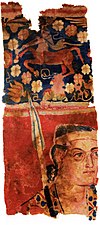Wikipedia:Today's featured article/November 22, 2005
The Ta-Yuan were a people of Ferghana in Central Asia, described in the Chinese Chronicles and in the Chinese Former Han History, following the travels of Zhang Qian in 130 BCE, and the numerous embassies that followed him into Central Asia thereafter. These Chinese accounts describe the Ta-Yuan as urbanized dwellers with Indo-European features, living in walled cities and having "customs identical to those of the Greco-Bactrians", a Hellenistic kingdom that was ruling Bactria at that time in today’s northern Afghanistan. The Ta-Yuan are also described as manufacturers and great lovers of wine. The Ta-Yuan were probably the descendants of the Greek colonies that were established by Alexander the Great in Ferghana in 329 BCE, and prospered within the Hellenistic realm of the Seleucids and Greco-Bactrians, until they were isolated by the migrations of the Yueh-Chih around 160 BCE. It has also been suggested that the name “Yuan” was simply a transliteration of the words “Yona”, or “Yavana”, used throughout antiquity in Asia to designate Greeks (“Ionians”), so that Ta-Yuan (lit. “Great Yuan”) would mean "Great Ionians".
Recently featured: Mário de Andrade – November – Federalist No. 10

